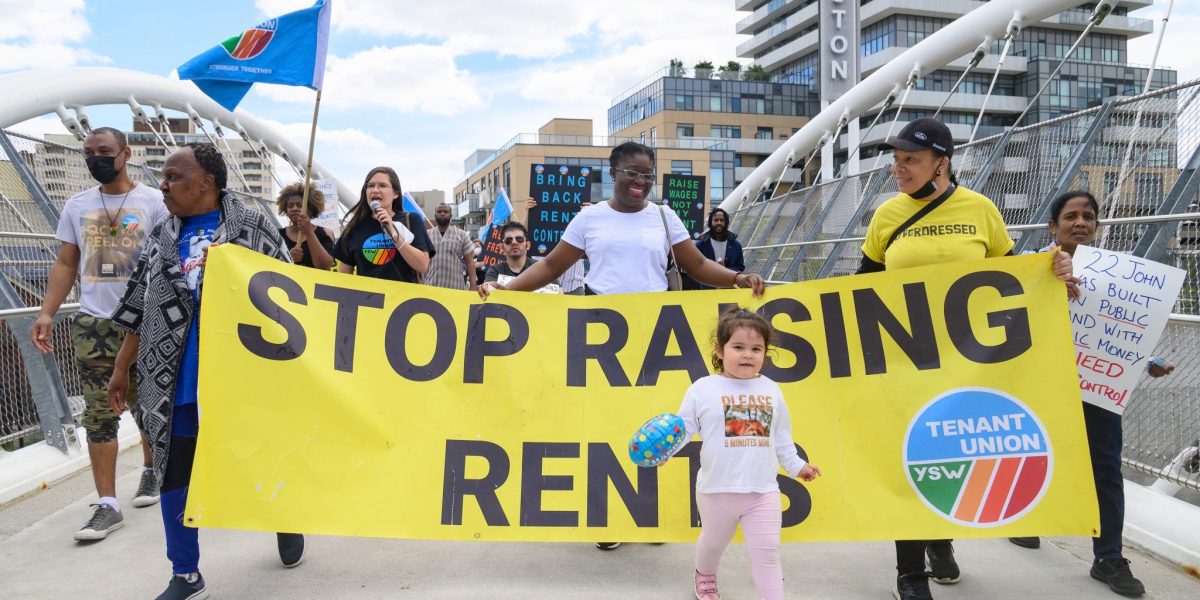On June 1, tenants at 33 King Street started a rent strike in response to yet another above-guideline rent increase (AGI). The group is part of the York Southwest Tenants’ Union, and has vowed to strike until reaching an agreement with the landlord.
The landlord in question, Dream Unlimited, purchased the building in 2021. They claim the AGIs are for necessary repairs, but tenants believe this is unfair. Some tenants are already in a position where they are having to pay rent instead of buying food.
Beverly Henry, a senior living on a fixed income at 33 King St, worries she’ll end up on the street if the AGIs are approved. “I have nowhere else to go,” she says.
Tenants already have to contend with stagnant wages and a rising cost of living. On top of that, the average rent for a one-bedroom apartment in Toronto currently sits above $2500. Factor in yearly AGIs and it becomes clear that tenants have no choice but to fight back against greedy landlords. This rent strike demonstrates the power of collective action.
Unjust AGIs drive prices up
According to guidelines, Ontario landlords are only allowed to increase rent for existing tenants – who occupy units in building built before 2019 – up to a limit that the province sets each year for inflation. In 2022, landlords were allowed to raise rent by 1.2 percent. In 2023, the guideline is set at 2.5 percent.
This jump is already significant enough for working class people and anyone living on a fixed income, such as seniors. But 2.5 percent is not the upper limit. If the landlord receives permission from the Landlord Tenant Board, they can force above guideline rent increases (AGIs) of up to an additional 3 percent onto tenants.
This practice is legal under the pretence of protecting tenant safety. But in reality, AGIs are used to force out vulnerable tenants and long-standing tenants whose units are protected by rent control. Furthermore, it often happens that the same building gets hit with a string of AGIs. Before Dream Unlimited purchased 33 King St, the previous landlord applied for six AGIs in 10 years.
In practice, AGIs are a tool that landlords use to squeeze out even more profits. Landlords, especially corporate landlords, should use funds in other sources to do necessary repairs, such as rent money, profits, or loans, instead of putting the burden on workers.
The Tenants’ Union: Stronger together
So far, 33 King Street’s tenants have been working together to put pressure on Dream Unlimited. While it might seem simple, organizing 200 people to take collective action is not easy.
Sharlene Henry, chair of the building’s tenant association, says, “People pride themselves on paying their rent on time. It’s not an easy feat mentally for someone to decide not to pay their rent.” Taking the risk to strike shows how fed up residents are with their landlord’s shenanigans.
Henry says that since 2018, hundreds of tenants have not been told what their legal rent is due to all the AGIs, lack of clear communication from the landlord, and other bureaucratic issues. Left with no other option, the tenants’ union has helped residents calculate what they think their legal rent is supposed to be. Henry reports that many tenants are paying what they estimate to be correct and hoping for the best.
This precarious situation has pushed tenants to the edge. When asked how everyone is holding up, Henry says, “People are really motivated as a unit by the fact that we as a collective have stood together. Collectively, I feel like morale is good.”
Negotiation
As of last week, no one has been served with N4s, the form landlords can issue to terminate a tenancy for non-payment of rent. Dream Unlimited has started calling tenants, but many are still waiting. Henry believes that a fair outcome would be a negotiation. Both the building’s owners have refused to negotiate with tenants for years, but the tenants are hoping the strike will pressure them to sit down and bargain.
As far as authorities go, there is little help available for tenants.
“It’s a really hard fight to win at the Landlord Tenant Board,” says Henry. “The Landlord Tenant Board is not for tenants.”
To get real results in their favour, tenants have to organize and push back on their own. The strike began on June 1 and is still going strong. If Dream Unlimited starts giving out N4s or refuses to negotiate, tenants will stage a large protest in front of the building.
Regardless of what happens next, this rent strike demonstrates that tenants are stronger together. Through organizing and collective action, tenants can hold corporate landlords accountable and highlight the need for systemic change. A win for one building is a win for tenants everywhere.
Did you like this article? Help us produce more like it by donating $1, $2, or $5. Donate

